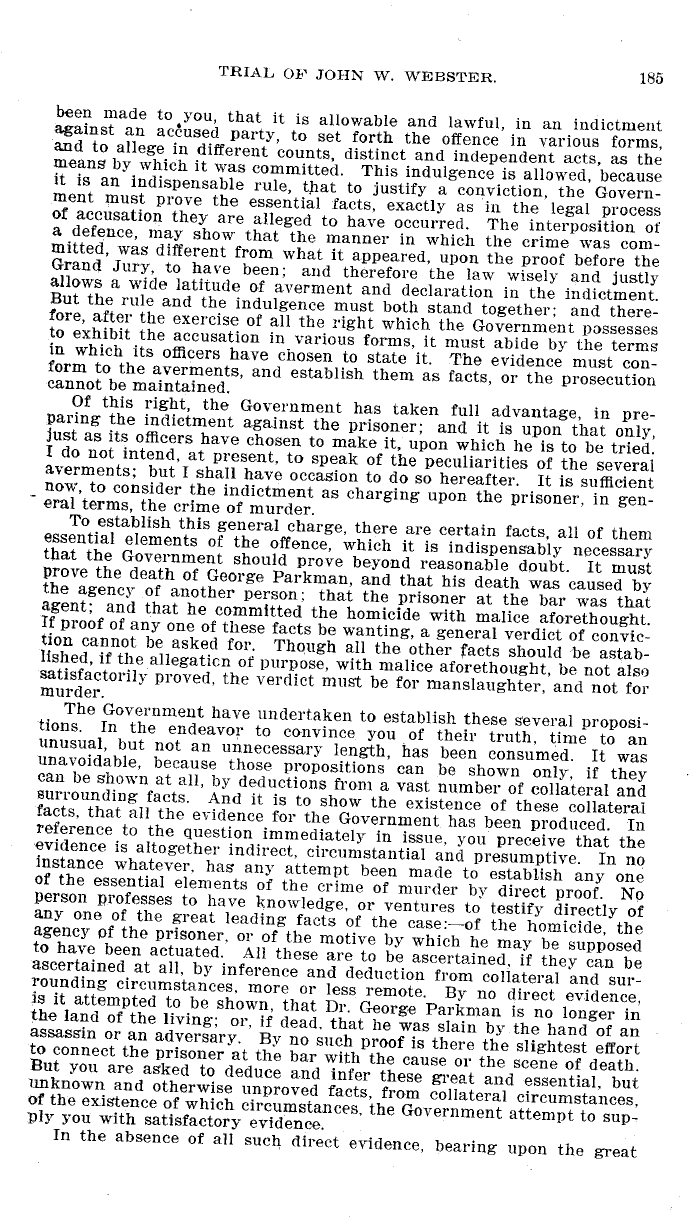|
TRIAL OF JOHN W. WEBSTER.
185
been made to you that it is allowable and lawful, in an indictment
against an accused party, to set forth the offence' in various forms,
and to allege in different counts distinct and independent acts, as the
means by which it was committed. This indulgence is allowed, because
it is an indispensable rule, that to justify a conviction, the Govern-
ment must prove the essential facts, exactly as in the legal process
of accusation they are alleged to have occurred. The interposition of
a defence, may show that the manner in which the crime was com-
mitted, was different from what it appeared, upon the proof before the
Grand Jury, to have been; and therefore the law wisely and justly
allows a wide latitude of averment and declaration in the indictment.
But the rule and the indulgence must both stand together; and there-
fore, after the exercise of all the right which the Government possesses
to exhibit the accusation in various forms, it must abide by the terms
in which its officers have chosen to state it. The evidence must con-
form to the averments, and establish them as facts, or the prosecution
cannot be maintained.
Of this right the Government has taken full advantage, in pre-
paring the indictment against the prisoner; and it is upon that only,
Just as its officers have chosen to make it, upon which he is to be tried.
I do not intend, at present, to speak of the peculiarities of the several
averments; but I shall have occasion to do so hereafter. It is sufficient
now, to consider the indictment as charging upon the prisoner, in gen-
eral terms, the crime of murder.
To establish this general charge, there are certain facts, all of them
essential elements of the offence, which it is indispensably necessary
that the Government should prove beyond reasonable doubt. It must
prove the death of George Parkman and that his death was caused by
the agency of another person; that the prisoner at the bar was that
agent; and that he committed the homicide with malice aforethought.
If proof of any one of these facts be wanting, a general verdict of convic-
tion cannot be asked for. Though all the other facts should be astab-
lished, if the allegaticn of purpose, with malice aforethought, be not also
satisfactorily proved, the verdict must be for manslaughter, and not for
murder.
The Government have undertaken to establish these several proposi-
tions. In the endeavor to convince you of their truth, time to an
unusual, but not an unnecessary length, has been consumed. It was
unavoidable, because those propositions can be shown only, if they
can be shown at all, by deductions from a vast number of collateral and
surrounding facts. And it is to show the existence of these collateral
facts, that all the evidence for the Government has been produced. In
reference to the question immediately in issue, you preceive that the
evidence is altogether indirect circumstantial and presumptive. In no
instance whatever, has any attempt been made to establish any one
of the essential elements of the crime of murder by direct proof. No
person professes to have knowledge, or ventures to testify directly of
any one of the great leading facts of the case:-of the homicide, the
agency of the prisoner, or of the motive by which he may be supposed
to have been actuated. All these are to be ascertained, if they can be
ascertained at all by inference and deduction from collateral and sur-
rounding circumstances, more or less remote. By no direct evidence,
is it attempted to be shown that Dr. George Parkman is no longer in
the land of the living; or, if dead, that he was slain by the hand of an
assassin or an adversary. By no such proof is there the slightest effort
to connect the prisoner at the bar with the cause or the scene of death.
But you are asked to deduce and infer these great and essential, but
unknown and otherwise unproved facts from collateral circumstances,
of the existence of which circumstances, the Government attempt to sup-
ply you with satisfactory evidence.
In the absence of all such
direct evidence, bearing upon the great
|

